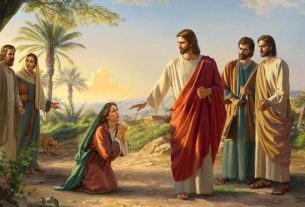By Wang Hong
Matthew 8:4 records that after the Lord Jesus cured a man of leprosy, He said to him, “See you tell no man; but go your way, show yourself to the priest, and offer the gift that Moses commanded, for a testimony to them.” Matthew 9:30 shows that after curing two blind men, “Jesus straightly charged them, saying, See that no man know it.” When Peter recognized the Lord Jesus as Christ, the Son of the living God, “Then charged he his disciples that they should tell no man that he was Jesus the Christ” (Matthew 16:20). Besides, the Lord Jesus led His disciples up into a high mountain and was transfigured before them. As they came down from the mountain, He gave orders to them, saying, “Tell the vision to no man, until the Son of man be risen again from the dead” (Matthew 17:9). Every time I read these verses, I wonder why the Lord warned man not to tell anyone after performing miracles.
Additionally, I found from the scriptures that not only I, but even the people by the Lord Jesus’ side, had such a question. The Bible says, “His brothers therefore said to him, Depart hence, and go into Judaea, that your disciples also may see the works that you do. For there is no man that does any thing in secret, and he himself seeks to be known openly. If you do these things, show yourself to the world” (John 7:3–4). Then, why did God warn man not to tell others after miracles? What was God’s intention by doing so? Carrying my confusion, I often prayed to the Lord, and asked Him to guide me to figure it out. Later, through searching related materials in many ways and fellowshiping with brothers and sisters who understood the Bible, I finally knew some of God’s will.
As is known to us, the wisdom of God surpasses man’s imagination. Every stage of God’s work is done by the result to achieve instead of by man’s notions and conceptions. God will do whatever is beneficial to His work and to His salvation for man. Through studying the Bible, it’s not difficult to find that when the Lord Jesus was born, He underwent the hunting of King Herod. (See Mat 2:12–21.) Think about that carefully, even though the Lord Jesus was only known to a few people at that time, He was hunted by King Herod. If He were known openly, would He be able to survive in this world or grow up enough to take on God’s redemptive work? From this passage, we can see that wherever God did His work, He would be persecuted by the ruler. Thus, in order to carry out God’s work smoothly, it was necessary for the Lord Jesus to exhort those who got cured and received revelations not to leak out His identity as God. Otherwise, it would interrupt and disturb God’s work.
Furthermore, when the Lord Jesus came to work, the chief priest, scribes and Pharisees were full of hate toward Him. Although they read the Bible, served God in the temple, and were longing for the coming of Messiah for generations, yet when they heard the sermons preached by the Lord Jesus, witnessed the miracles performed by Him, and appreciated from the work and words of the Lord that His words had authority and power, is the truth and can’t be expressed by man, they still deliberately resisted and wildly condemned Him. The Bible says: The Lord Jesus cured the blind men and advised them not to tell anyone else. But they told others once they departed for they thought the Lord did a good thing; they wanted to proclaim the Lord Jesus’ name, rather than to frame Him. However, their good intention disturbed God’s work. The Pharisees condemned the Lord Jesus by using this chance, saying, “He casts out devils through the prince of the devils” (Matthew 9:34). According to this record, we can see that the reason why the Lord not want the miracles He performed to be told was because man’s good intentions and zealousness would leave those Pharisees a chance and give them a handle. At that time, the Pharisees wanted to find fault with the Lord Jesus very much. From the fact that they tempted the Lord Jesus many times, it can be seen that once they got a handle, they would put Him to death. Since the Lord Jesus came on earth to complete the redemptive work, before its completion, He would certainly do his work in a secret way. Just as the Lord Jesus said, “My time is not yet come” (John 7:6). It means that the time for His crucifixion had not yet come. So, His identity shouldn’t be known too early by man. To protect His work from being disturbed, interrupted and blocked, He used His wisdom of working in a hidden way. And it was the hidden work that allowed the gospel of the kingdom of heaven to spread, and made a few people know God’s new work.
Although the Lord Jesus did His work in secret from the very beginning, He only kept it from those unbelievers, but to His disciples, it was open. Only at this moment did I realize why the Lord Jesus told His disciples not to tell others about the miracles He performed. Because God knew clearly about the substance of those in power, the chief priests, scribes, and Pharisees from religious circles is in opposition to God, and He had a thorough understanding of their truth-hating natures. He even more knew that the statures of His followers were small and how He could bring them before Him. From the hidden work of God, we can see the Lord Jesus’ wisdom of working, and deeply appreciate God’s love and care for His followers. Everything that He did was for man’s salvation and for man’s life, so that man could avoid Satan’s disturbance and temptations. That was something that I had never noticed and experienced by reading the Bible previously. The chief priests, scribes and Pharisees at that time had ever heard or seen many kinds of miracles performed by the Lord Jesus. But they were afraid that if the Jewish people all followed the Lord Jesus, their positions would be in danger. In order to abolish God’s work, they did their utmost to find handles against the Lord Jesus for condemnation. Their truth-hating nature was completely exposed before God. In such a situation, the Lord Jesus’ work in secret was mainly in order to avoid temptations, carry out His work in the flesh smoothly, as well as reveal men, revealing the believers and unbelievers, true believers and false believers.
However, God does not always do His work in a secret way. When God’s work was about to end, the Lord Jesus engaged with the Pharisees openly. I saw a passage of words in a spiritual book, saying, “During the Age of Grace, Jesus preached openly throughout the land for the sake of His gospel work. He engaged with the Pharisees for the sake of the work of crucifixion; if He had not engaged with the Pharisees and those in power had never known of Him, how could He have been condemned, and then betrayed and nailed to the cross?” It turned out that the Lord Jesus worked openly when His work on earth came to an end. His purpose of doing so was to complete the redemption work: His crucifixion. Only when His work was completely known to all did the Pharisees have opportunities to find handles against Him, condemn Him by the law, and nail Him to the cross. God completed the redemptive work utilizing their persecution and resistance, which was arranged by God long ago. If He had not done His work like this, how could He be nailed to the cross, and complete the work of all mankind’s redemption? In man’s view, the merciful Lord Jesus should not be nailed to the cross. But in God’s eyes, His redemptive work was finished. God’s work is so wise that man can never perceive. This just fulfilled God’s word, “My wisdom is exercised based on Satan’s schemes.” In this way, God not only completed the salvation work for mankind but revealed and condemned the opponents of God as well.
After I understood that at the Age of Grace, the Lord Jesus did His work first in secret and then in public, I found it aroused my reflection and awareness: When the Lord Jesus was doing His work, the religious world and those in power resisted God and didn’t welcome God’s return. What if the Lord Jesus came to work again? Would He still be crazily resisted and persecuted by the religious world and those in power? Would God still do His work first in secret and then in public?



